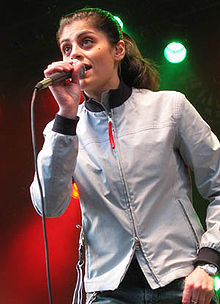Dilba: Difference between revisions
Kjell Knudde (talk | contribs) Added more categories. |
|||
| (3 intermediate revisions by 2 users not shown) | |||
| Line 1: | Line 1: | ||
{{Short description|Swedish singer (born 1971)}} |
|||
{{for|the city in Iran|Delvar}} |
{{for|the city in Iran|Delvar}} |
||
| Line 62: | Line 63: | ||
[[Category:Living people]] |
[[Category:Living people]] |
||
[[Category:Swedish pop singers]] |
[[Category:Swedish pop singers]] |
||
[[Category:Swedish |
[[Category:Swedish women pop singers]] |
||
[[Category:20th-century Swedish songwriters]] |
|||
[[Category:Swedish people of Kurdish descent]] |
[[Category:Swedish people of Kurdish descent]] |
||
[[Category:Turkish Kurdish people]] |
[[Category:Turkish Kurdish people]] |
||
| Line 68: | Line 70: | ||
[[Category:21st-century Swedish women singers]] |
[[Category:21st-century Swedish women singers]] |
||
[[Category:Melodifestivalen contestants of 2011]] |
[[Category:Melodifestivalen contestants of 2011]] |
||
[[Category:21st-century Swedish songwriters]] |
|||
Latest revision as of 17:51, 2 October 2024
Dilba | |
|---|---|
 Dilba performing at Liseberg, Gothenburg. | |
| Background information | |
| Birth name | Dilbahar Demirbağ |
| Also known as | Dilba |
| Born | 24 November 1971 Elazığ, Turkey |
| Genres | R&B, pop, dance |
| Occupation | Singer-songwriter |
| Instrument(s) | Piano, guitar, singing |
| Years active | 1996 – present |
| Labels | Warner Bros. Records |
Dilbahar Demirbağ (born 24 November 1971), known as Dilba, is a Swedish pop singer of Kurdish background. Her first album Dilba (1996) reached commercial success.
Early life
[edit]Dilba was born in Kirvan, a village in eastern Turkey, and her family is ethnic Kurd.[1] She immigrated to Sweden when she was only four years old, where she grew up in Karlstad and Uppsala. She has four siblings: Dilşa, Dilnarin, Dilber and Assan.
Dilba was introduced to the piano as early as when she went to kindergarten and is also self-taught in the guitar. She started her career as a DJ and she has also worked as a backup singer for the Swedish pop singers Jennifer Brown and Eric Gadd.
Recording career
[edit]In 1996, Dilba released her debut album Dilba together with the single I'm Sorry. All the lyrics of the songs on this album were written by herself, just like the music. The album was a success, and she was awarded with a Grammy and the Aftonbladet prize Rockbjörnen. The album sold more than 100,000 copies in Sweden.
After a successful summer tour in 1997, it took two years until she released her second album You & I in 1999. It was rewarded with five plus by Aftonbladet and over all great reviews by the critics and sold gold over 20,000 copies in sweden.
Dilba's third album Revolution was released in March 2003, along with the single Every Little Thing, which was a success on the radio. In 2005, Dilba composed the song Miracle, which became the theme score for the Swedish television's TV-series Kommissionen. Also, during the autumn of 2005, Dilba had regular live performances at a club in Stockholm.
Dilba participated in Melodifestivalen 2011, the Swedish selection for the Eurovision Song Contest 2011. She competed in the first semi-final on 5 February 2011 at Coop Norrbotten Arena, Luleå with the song "Try Again" (Pettersson/Sonnvik) but she did not qualify for the next round. The song however became an instant hit, went straight to iTunes number one and Digilistan's second place. An EP of Try Again also followed.
Personal life
[edit]In 1998, Dilba met pop singer Martin Svensson at a party, and they later married in the summer of 2000. A divorce was filed in 2002.
In July 2007, Dilba was detained from boarding a plane to the United States after joking that she had some planes to bomb.[2]
Dilba also starred in Let's Dance 2008, but was voted off the show.
Her sisters are dancer Dilnarin Demirbag and journalist Dilsa Demirbag-Sten.
Discography
[edit]- Dilba (1996)
- You & I (1999)
- Live at Lydmar (2002)
- Revolution (2003)
References
[edit]- ^ "Allt för min syster". 29 July 2007.
- ^ Singer: 'I had some planes to bomb', The Local, July 3, 2007
